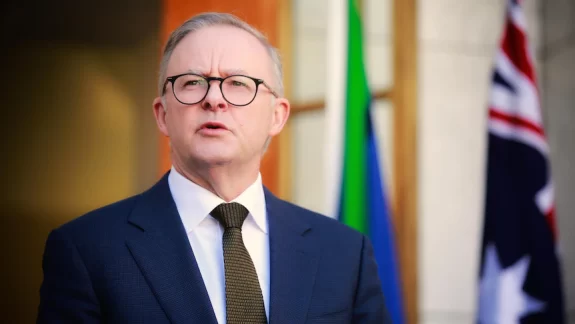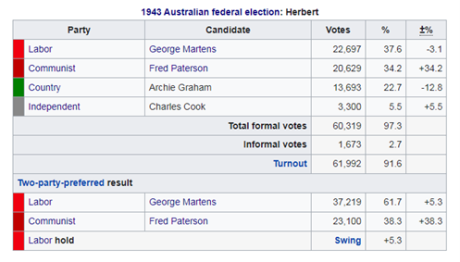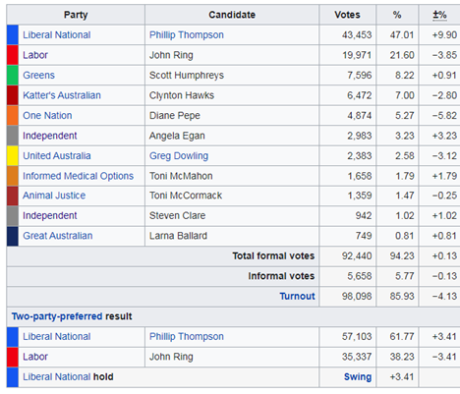Australian Labor: Attending to Our Rivers of Concern?

By Denis Bright
As the high noon of the summer holiday season approaches, the Albanese Government had a last hurrah with the passage of those caps on gas and coal prices in both houses of parliament.
Passage of this legislation through the senate was always uncertain. In the end, the government was supported by the Greens, ACT’s Senator David Pocock and the two senators from the Jackie Lambie Network. Support from the Greens was conditional on additional financial support for households and businesses to electrify their heating and cooking equipment to assist with the move away from gas fuels. The final outcomes of this legislation are still fluid as noted by ABC News (15 December 2022):
That last-minute deal will be negotiated in the months to come and included in the government’s May budget next year.
The Treasurer said price caps would reduce next financial year’s electricity price rises by 13 percentage points – still a 23 per cent price rise on this year.
Treasury has not revealed its full modelling, but the ABC estimates based on figures given by the department that it will mean a $700 increase for the average household, from an implied annual cost of $1,474 as at June 2022, to an annual bill of $2,176 by the end of next financial year.
The $3 billion in energy bill relief for people receiving Commonwealth income support will go some way to covering the remaining cost increases for those most exposed.
That support won’t drip through until at least April, as the Commonwealth works through how to deliver the program with each of the states, but it is expected to be delivered directly through power bill reductions.
The government’s openness about negotiations with cross bench senators is a good sign for a cynical electorate that hedges its support for the major parties by shaving 0.76 per cent off Labor’s national vote of 32.58 per cent and 5.7 per cent off the total vote for the Coalition parties of 35.7 per cent at the election on 21 May.
Labor’s openness about negotiations with the crossbench on the controversial provisions of caps on coal and gas prices also extends to the decision of Labor’s National Secretariat to release a review of its successful federal campaign in 2022. The full report can be difficult to access but it is worth a look.
The campaign review admits that federal Labor has real problems with its heartland support base particularly in Queensland and in Tasmania.
Decades of neoliberal agendas from both sides of Australian politics have created new wealth and social divides across Australia with particular problems in less advantaged outer suburban and regional electorates.
Anne Davies of The Guardian (13 December 2020) used a quote from Labor sources to estimate that membership of the national ALP branches was just over 60,000. Labor Party membership is attractive to a newer generation of middle income members but with some notable exceptions it has become difficult to attract new members from the more traditional working classes. This problem extends to membership of trade unions affiliated with the Labor Party as noted in the latest trade union membership data from ABS (14 December 2022) from a reference period that ended last August. An array of graphics is available from the ABS site for perusal by interested readers but the trend-lines are disturbing for the future of the broader Labor Movement:
- 12.5% of employees (1.4 million) were trade union members.
- Since 1992, the proportion of employees who were trade union members has fallen from 41% to 12.5%.
- The Education and training industry (30%) and the Professionals occupation group (19%) had the highest rates of trade union membership.
Despite the decline in affiliated trade union membership, the 2020s have been a real highwater mark in Australian Labor History.
After the NSW state elections on 23 March 2023, every mainland state of Australia is likely to be in Labor hands. This was never the case in other high watermark days of the Labor Movement like 1943, 1972, 1983 or 2007. It is quite a paradox to have the Labor movement in power across Australia at the zenith of global capitalism on the international scene.
Good campaigning of course needs reinforcement from grassroot opinion. Policy is mentioned over fifty times in the current national document released by the National Secretariat. The review makes 27 recommendations across 5 areas, ranging from the Labor party’s values, purpose and method in government; who we seek to represent; policy, strategy and communications; campaign preparedness and operations; and how Labor might engage better with that stated membership of over 60,000 branch members.
My recent article on the successful Victorian election gave favourable mention to the fourteen policy committees within the Victorian ALP. The work of the formal committees could be popularized by accredited policy associations to promote interactions with grassroots opinions. This would prevent policy frameworks from becoming the property of insider opinions and not offering solutions to the rivers of concern within the community on policy directions.
There were valiant efforts of Victoria’s Country Labor Executive (CLX) in regional areas with some success in Ballarat, Bendigo and Corangamite through community forums and consensus-building campaign activities. Victoria Labor achieved a net gain of one seat state-wide and the final result eclipsed Premier Andrew’s 2018 result.
Former federal member Darren Cheeseman from Corangamite achieved an extraordinary swing of 6.8 per cent to Labor after preferences in state electorate of South Barwon which covers the Geelong suburbs of Highton, Waurn Ponds, Grovedale, Mount Duneed and Armstrong Creek. Campaigning is more challenging in some regional areas.
Mildura Labor has been active in promoting community involvement with support for initiatives which have resonance in the local community like the upsurge threats from snakes in flood prone areas which justify support for health warnings from the Loddon Mallee Public Health Unit. There was also a worthwhile invitation to attend a working bee at the Mildura Eco Village on 11 December 2022.
Victorian Labor was outsmarted in the end by a populist National Party campaign in some regional seats which replaced key progressive independents by loyal coalition members with a strident commitment to neoliberal values behind colourful rhetoric about perceived neglect of country areas.
Labor maybe on the threshold of results that surpass even John Curtin’s campaigning efforts during the wartime emergency in 1943. Changing needs made the 1930s priorities of tuning into Britain in foreign policy and austerity in the management of post-Great War public debts suddenly quite irrelevant.
In the Townsville based federal electorate of Herbert, John Curtin’s team is a long way from being eclipsed. Examples of similar shortcomings abound in any review of recent electoral statistics. Perhaps Herbert is a very extreme case of Labor’s challenges from grassroots opinion. The AEC site will provide plenty of less extreme changes in public opinion.
Herbert Votes Then and Now

2022 Election in Herbert

 Denis Bright is a financial member of the Media, Entertainment and Arts Alliance (MEAA). Denis is committed to consensus-building in these difficult times. Your feedback by using the Reply button on The AIMN site is always most appreciated. It can liven up discussion. I appreciate your little intrusions with comments and from other insiders at The AIMN. Full names are not required when making comments. However, a valid email must be submitted if you decide to hit the Reply button.
Denis Bright is a financial member of the Media, Entertainment and Arts Alliance (MEAA). Denis is committed to consensus-building in these difficult times. Your feedback by using the Reply button on The AIMN site is always most appreciated. It can liven up discussion. I appreciate your little intrusions with comments and from other insiders at The AIMN. Full names are not required when making comments. However, a valid email must be submitted if you decide to hit the Reply button.
Like what we do at The AIMN?
You’ll like it even more knowing that your donation will help us to keep up the good fight.
Chuck in a few bucks and see just how far it goes!
Your contribution to help with the running costs of this site will be gratefully accepted.
You can donate through PayPal or credit card via the button below, or donate via bank transfer: BSB: 062500; A/c no: 10495969










11 comments
Login here Register here-
Leila -
Marcia -
Indigo -
Tessa_M -
James Robo -
rubio@central coast -
Clakka -
Stella -
Workplace Activist -
Indigo -
Bertrand
Return to home pageMaintaining that working arrangements with the Greens and TEAL candidates is so important. Getting the energy bill through both houses of parliament was a real achievement.
Thanks Denis . A good article for these changing times and challenges ahead .
Interesting article Denis. Thanks so much.
John Curtin quickly became a national hero through the strength of his commitments to difficult times. Unlike Anthony Albanese, his government did not have a majority in the lower house and formed a new government in late 1941 when independent members lost confidence in Arthur Fadden’s UAP Government. The change from Fadden to Curtin did not require an election.
I still think that there are parallels with the current state of Australian politics. The conservatives tuned into Britain in the 1930s and were afraid to take up the possibilities of greater independence for Australia in foreign policies which were made possible by the formation of the British Commonweath.
Today’s conservatives are rusted on supporters of the US military industrial complex which offers those new fleets of nuclear submarines to annoy our best trading partner.
The multiple ministry exercise by Scott Morrison gave the game away. This was a most unstable period in Australian political history.
Thanks for getting Australians out of the LNP’s attempts at a one party neoliberal state, Albo
I agree Indigo. Anthony Albanese has a lot in common with John Curtin. Albanese was lucky enough to be rewarded with a house majority that improves his negotiating skills with the crossbench.
Talking about change, it is another windy weekend on the Central Coast. How is the situation up north on the Gold Coast?
We are already seeing a significant rise of union activity in Britain and the USA. People will be well aware of the economic and social dire straits of those countries, and the death and destruction wrought by the faux democracy of Putin’s Russia along with burgeoning social and economic burdens brought by him and his fellow autocrats in eastern Europe.
With trust in governments at an all-time low, following the smashing of the utterly corrupt and incompetent Morrison government, the onset of globally-induced hard times, and the very high risk of a return to high unemployment, younger folk may well be drawn towards union membership. As the unions continue to wise-up, and ditch the remnants of antediluvian ideologies and closed-door members-only divisiveness, they free themselves for growth. A focus on modernisation of their ways and policies to suit current circumstances, may just achieve a re-growth to meaningful representation.
So far Albo and his team have demonstrated collaboration, skill and determination. Not only quickly attending to important legislative reform, but also facilitating a return of reasonable balance of representation to labour, whilst unequivocally bringing to light and prosecuting the corrupt excesses and institutions of the LNP. But wielded global capital is bringing strong headwinds, and they need to continue with intelligence and resolve to restore function and security to the country.
I believe they have the capacity to govern for all, so given persistent hard work, they may well see a growth of confidence and increase in voter support, all essential for efficient and effective transition from the toxicity of the olde worlde.
Thanks for an interesting article Denis.
Thanks Clakka.
Outside key services and industries, new recruits are socialized to stand alone in their relationship with employers.
The latest data on trade union membership in Australia from the Bureau of Stats is not very encouraging. New recruits are always encouraged to toe the line during probationary periods by taking on more unpaid extended work time and compromises with penalty rates.
Employers large and small are delving into the backgrounds of potential recruits and are prepared to pay for these background checks.Background checks often include social media activity by all applicants for jobs, driving history and even credit ratings.
Media networks seldom work through the ethical and human rights standards of business proprietors.Tax evasion is widespread by business insiders with access to the best accountants.
I hope that trade union leaders can be more proactive with the recruiting of new members now that Labor governments have been elected in most states and now at federal level.
Labor’s revival as a political force depends on higher levels of commitment to trade union values and exposure of employers who routinely discriminate against potential trade union activists. it is no surprise that lower level employees work long hours at falling rates of real wages in this new inflationary era.
As in politics the change from the South did reach the Gold Coast. The SE change is expected to pick up later.
There was a big swing against the LNP in McPherson on primary votes on 21 May but those far-right parties protected Karen Andrews here with the disciplined flow of preferences and added another 16 percent to her primary vote. This cushioned the extent of the swing against the LNP.
Controls must be placed on the capacity of minor far-right parties to influence outcomes and to collect money for campaign expenses and public funding of outcomes at a rate of three dollars a vote.
Surely this is a form of electoral corruption as those minor political parties do not have a real presence in the community.
I think these disturbing trends in decreasing union membership and political engagement are worthy of serious concern.
Dropping union membership decreases the power of unions with in turn leads to more hemorrhaging of members. This is a difficult spiral to stop.
And dropping political party membership hollows politics out. Political parties cannot adequately advocate without being genuinely representative and democratically led.